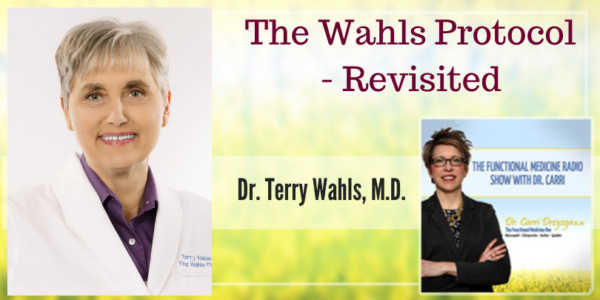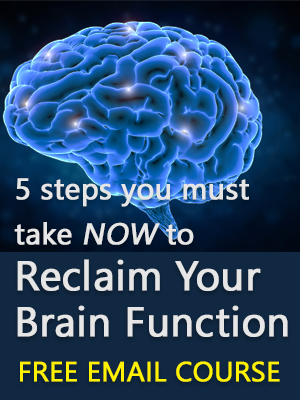Podcast: Play in new window | Download
Subscribe: Apple Podcasts | Android | RSS
In this episode of The Functional Medicine Radio Show, Dr. Carri’s special guest Dr. Terry Wahls explains her updated version of the Wahls Protocol for MS, autoimmune disease, and a number of other health issues.
Dr. Wahls is an Institute for Functional Medicine Certified Practitioner and a clinical professor of medicine at the University of Iowa where she conducts clinical trials. In 2018 she was awarded the Institute for Functional Medicine’s Linus Pauling Award for her contributions in research, clinical care and patient advocacy. She is also a patient with secondary progressive multiple sclerosis, which confined her to a tilt-recline wheelchair for four years. Dr. Wahls restored her health using a diet and lifestyle program she designed specifically for her brain and now pedals her bike to work each day.
She is the author of The Wahls Protocol: How I Beat Progressive MS Using Paleo Principles and Functional Medicine, The Wahls Protocol: A Radical New Way to Treat All Chronic Autoimmune Conditions Using Paleo Principles, and the cookbook The Wahls Protocol Cooking for Life: The Revolutionary Modern Paleo Plan to Treat All Chronic Autoimmune Conditions.
Main Questions Asked about the Wahls Protocol:
- Can you tell us your story of beating MS?
- So, can you give us the basic principles of your plan for your brain health and mitochondrial health (the Wahls Protocol)?
- You still use these principles in your clinics to help patients?
- So, it’s not just for MS and autoimmune disease?
- And, it’s not expensive?
- I would think within your group classes, there’s a certain amount of support from everybody?
- Thinking about the different parts of the Wahls Protocol, what are the three things listeners could do right now to start helping themselves?
- Are you still doing research?
Key Points made by Dr. Wahls about the Wahls Protocol:
- I’m a conventional internal medicine doctor who was diagnosed, in 2000, with multiple sclerosis. Of course, I wanted to treat my disease aggressively but, despite the best people and newest drugs, I went relentlessly downhill. In 2002, I was introduced to the Paleo Diet, but I continued to go downhill.
- But I’d been reading the basic science, ancestral health principles, functional medicine, and integrating all that I was reading. I designed a diet and lifestyle protocol for my mitochondria, for my brain cells, to slow my decline. And to my amazement, my brain fog went away, my pain was stopped, and then I began getting stronger.
- The first thing I’d been adding were supplements targeting my mitochondria, then I though of using the nutrients in my supplements as a guide for how I should design my nutrition plan. So, I created a very structured Paleo diet. Once I redesigned my diet, the speed of change was breathtaking.
- So much so that I started focusing on diet in my clinics, the primary care clinic, the traumatic brain injury clinic, and I had remarkable results. Remarkable success at getting people to make these big changes.
- I began seeing people from the pain clinic, people from primary care and psychiatry clinics with complicated medical problems; and we’re helping them.
- We’re turning off brain fog, we’re stabilizing their mood, we’re dramatically improving their blood sugars; people with severe obesity are beginning to lose weight.
- It was remarkable the variety of people that would come. We had so many people coming that we had to figure out how to do all this in group classes.
- I ended up having to give quarterly reports to the chief of staff and director of the hospital with our progress – the number of people we saw, how we changed their overall blood pressure, their blood sugars, their lipid values, their use of pain meds, their use of blood sugar meds, the use of meds overall because we were so successful.
- I also want people to understand that many of the people we were serving at my clinic had severe financial restraints, so I’m teaching people how to make these changes while living on a fixed income. I did all this doing basic primary care lab work and using basic supplements.
- I’m now teaching at the Institute for Functional Medicine and the American Academy of Anti-Aging Medicine that we can have success without a lot of labs, without lots of supplements – we did this through classes, group efforts, teaching people how to cook, various meditative practices, movement practices and creating the group bond.
- There’s a huge level of support, they inspire one another. That peer to peer conversation bout real experience is so powerful. It’s actually a much more complex process of behaviour change.
- I managed to create a more detailed, step-by-step, process that we go through in a very intentional way to support changing behaviour.
- This is discussed in my book, and I’ve started a training program to train other practitioners to have this more detailed approach to help people be successful.
- So, in addition to talking more about behavioural changes in the new book; we talk more about food addictions, and how to personalize the diet if you’ve got oxalate issues or FODMAP or histamine issues.
- I think that the discussion about behaviour change is very powerful, for both practitioners and patients.
- I think understanding what you want your health for is very important, because doing change is work.
- The next thing to work on is adding more non-starchy vegetable to your diet.
- The third thing is, if you’re not comfortable cooking from scratch (without having to go to boxes and cans), I’d sure like you to get a cooking class that can help you learn to improvise and cook with the ingredients you have on hand.
- Of course, our goals, hopes and dreams will evolve and change as our circumstances change, but they fuel the desire to do the work. I also encourage having a physical goal.
- I’m in the process of comparing a low-fat diet, known as the Swank diet, to the modified Paleo diet (the Wahls diet); we’re just analyzing that data now.
- I’m in the process of getting approval to start a new study – we’ll compare two cohorts, one group being trained on basically the Wahls Protocol, diet and lifestyle, the Wahls diet, a stress reducing practice and exercise program.
- We’ll compare that cohort to a cohort that’s getting the standard conventional approach (drugs) in the MS clinic at the university. We’ll compare the cohorts to see how they do. If I can show that these two groups are equivalent, that will be incredibly powerful.
- If you go to my website, you’ll see links to a seminar that we have, it’s a live event every year where hundreds of people come from all over the globe.
- The new book will be available as of March 17th, 2020.
Resources Mentioned for the Wahls Protocol:
Interview – The Wahls Protocol – How I Beat Multiple Sclerosis (2014)
Interview – The Wahls Protocol Cooking for Life (2017)
Book – The Wahls Protocol: How I Beat Progressive MS Using Paleo Principles and Functional Medicine
Book – Reclaim Your Energy and Feel Normal Again
Thank you for listening! If you enjoyed this podcast, please subscribe and leave a 5 star rating and review on iTunes!




